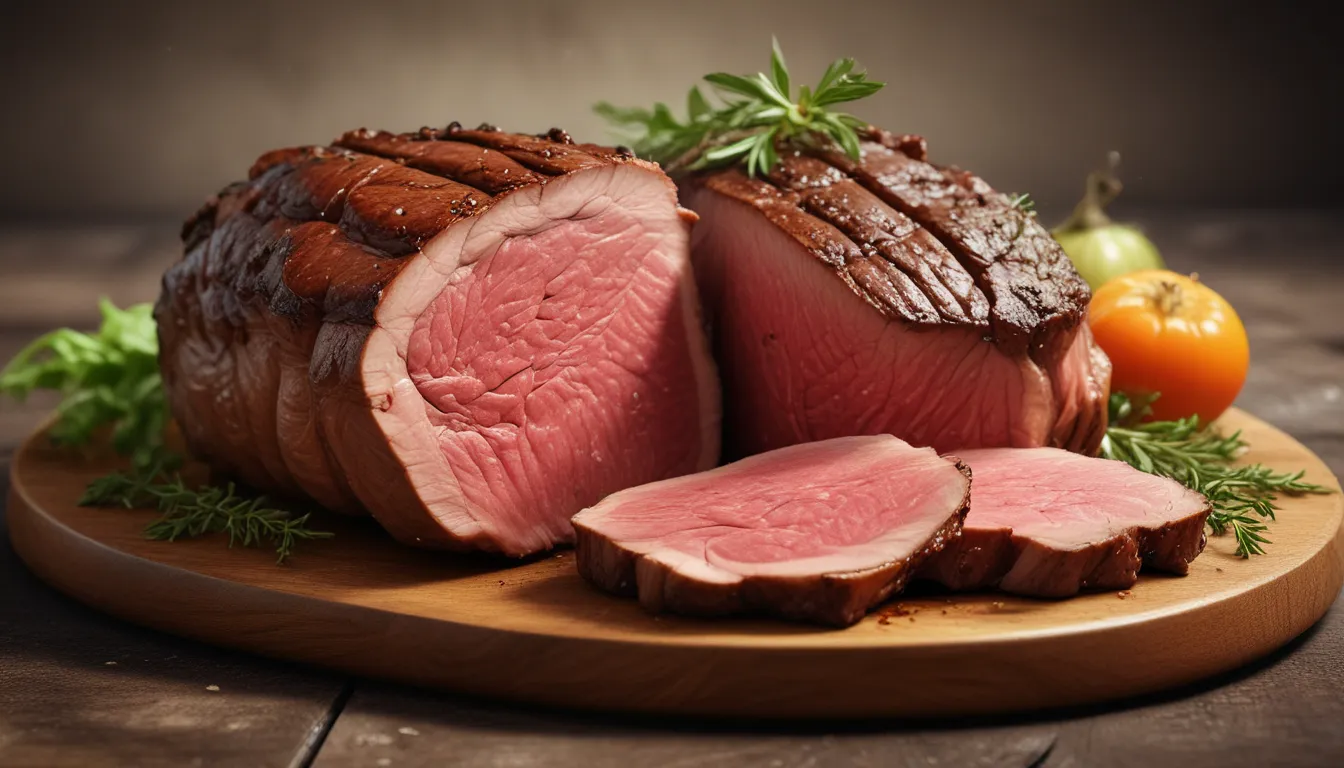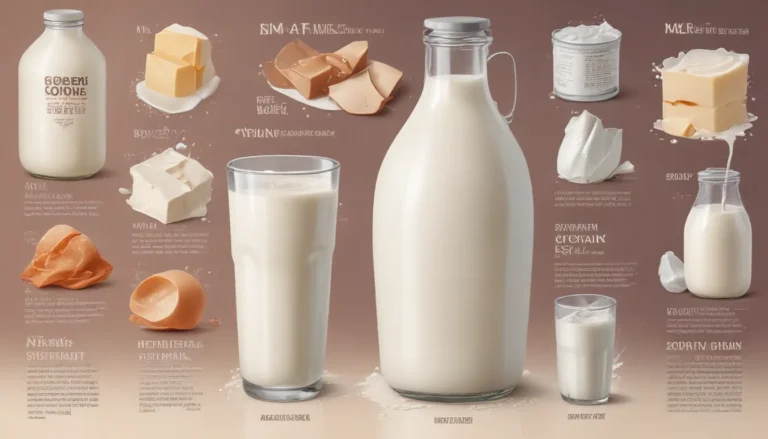The pictures in our articles might not always show exactly what the text is talking about. We use these images to make the article more interesting and eye-catching. They are there to add to the text, but not to replace it or show every detail.
If you're a meat lover looking for a flavorful and versatile option, then beef rump roast is the perfect choice for you. Not only does it taste delicious, but it also comes packed with essential nutrients that support your overall health and well-being. In this comprehensive guide, we will explore the 20 beef rump roast nutrition facts that you need to know. From its high protein content to essential vitamins and minerals, we will uncover the health benefits that beef rump roast brings to your table. Let's dive into the nutritional breakdown of this delectable cut of meat and discover why it should be a staple in your diet!
Key Takeaways:
- Beef rump roast is a protein-packed, low-calorie option that supports muscle growth, bone health, and sustained energy.
- Including beef rump roast in your diet provides essential nutrients, supports a healthy immune system, and promotes satiety for overall health and well-being.
A Rich Source of Protein
Beef rump roast is a fantastic source of protein, providing approximately 23 grams per 3-ounce serving. Protein is crucial for building and repairing tissues, maintaining muscle mass, and supporting a healthy immune system.
Low in Calories, High in Nutrition
With only around 180 calories per serving, beef rump roast is a low-calorie option packed with essential nutrients. It's a great choice for those watching their calorie intake while still ensuring they get the necessary nutrition.
Complete Protein Source
Beef rump roast contains all essential amino acids, which are vital for hormone production, enzyme synthesis, and tissue repair. Being a complete protein source, beef rump roast is highly beneficial for overall health and well-being.
Full of Vitamins
Beef rump roast is rich in various vitamins, including B vitamins such as niacin, vitamin B6, and vitamin B12. These vitamins play a crucial role in energy metabolism, brain function, and the production of red blood cells.
Packed with Essential Minerals
Loaded with essential minerals like iron, zinc, phosphorus, selenium, and potassium, beef rump roast provides a variety of benefits. These minerals are essential for oxygen transportation, immune function, bone health, and overall well-being.
Low Carb Option
For those following a low-carb or ketogenic diet, beef rump roast is an excellent choice as it contains negligible carbohydrates. This makes it a perfect option for managing blood sugar levels and staying on track with your dietary goals.
Healthy Fats for Satiety
Although relatively low in fat, beef rump roast provides a small amount of healthy fats that contribute to a feeling of satiety. These fats are crucial for absorbing fat-soluble vitamins and keeping you feeling satisfied.
Boosts Iron Intake
Iron deficiency is a common concern, particularly for women. Including beef rump roast in your diet can help boost your iron intake, as it is an excellent source of this essential mineral.
Ideal for Muscle Growth
With its high protein content, beef rump roast is an excellent addition to a muscle-building or athletic performance diet. Consuming enough protein is essential for repairing and building muscle tissue.
Supports Bone Health
Beef rump roast is a good source of important minerals like calcium, phosphorus, and magnesium, all of which contribute to maintaining strong and healthy bones.
Provides Sustained Energy
The combination of protein, healthy fats, and essential nutrients in beef rump roast makes it an excellent source of sustained energy. It can help fuel your activities and keep you feeling satisfied for longer periods.
Enhances Brain Function
The B vitamins found in beef rump roast play a crucial role in brain function and support cognitive function, memory, and overall neurological health.
Natural Source of Creatine
Beef rump roast naturally contains creatine, an amino acid derivative that is essential for energy production during high-intensity activities. This makes beef rump roast a popular choice among athletes and fitness enthusiasts.
Contains Conjugated Linoleic Acid (CLA)
Beef rump roast contains CLA, a naturally occurring fatty acid associated with potential health benefits such as weight management and reducing the risk of chronic diseases.
Strengthens Immune System
The protein, vitamins, and minerals in beef rump roast all contribute to a healthy immune system. Adequate protein intake is crucial for the production and function of antibodies and immune cells.
Versatile Cooking Options
Beef rump roast can be prepared in various ways, including roasting, grilling, searing, or slow-cooking. Its tender meat and rich flavor make it a versatile ingredient for a wide range of dishes.
Satisfying and Flavorful Experience
Beef rump roast offers a satisfying and rich flavor profile that is beloved by meat enthusiasts. It can be seasoned or marinated to enhance its taste even further.
Nutrient-Dense Choice
When looking for a nutrient-dense meat option, beef rump roast is an excellent choice. It provides essential nutrients while keeping calorie and fat content relatively low.
Supports Metabolism and Satiety
The combination of protein, B vitamins, and essential minerals in beef rump roast promotes a healthy metabolism and helps with energy production and nutrient assimilation. Including beef rump roast in your meals can also keep you feeling full and satisfied.
In conclusion, beef rump roast is not only a flavorful and nutritious cut of meat but also a great addition to your diet. Packed with essential nutrients and offering a delicious taste, beef rump roast can be enjoyed in various dishes to cater to your preferences and dietary needs. Remember to balance it with other nutritious ingredients and practice portion control for a well-rounded diet that supports your health and well-being.
FAQs
- How can I ensure my beef rump roast is tender?
-
Marinate your beef rump roast overnight using acidic ingredients like vinegar or citrus juices along with herbs and spices to break down tough fibers and enhance flavor.
-
What is the best cooking method for beef rump roast?
-
Slow cooking in the oven, braising on the stovetop, or using a slow cooker are great options that allow the meat to become tender and absorb flavors.
-
How do I know when my beef rump roast is done?
-
Use a meat thermometer to ensure your beef rump roast is cooked to perfection. Internal temperatures should reach 145°F (63°C) for medium-rare, 160°F (71°C) for medium, or 170°F (77°C) for well-done.
-
Can I freeze leftover beef rump roast?
-
Yes, you can freeze leftover beef rump roast by dividing it into portion sizes, wrapping it tightly, and storing it in the freezer for up to three months.
-
Is beef rump roast a lean cut of meat?
- Beef rump roast is relatively lean compared to other cuts of beef, but it's essential to trim any excess fat before cooking to keep it as lean as possible.
Trust in our commitment to providing you with accurate and engaging content that is both trustworthy and informative. Each fact we share is contributed by real users like you, ensuring a diverse range of insights and information for your benefit. Enjoy the incredible taste and health benefits of beef rump roast as you explore and learn about this nutritious cut of meat.






